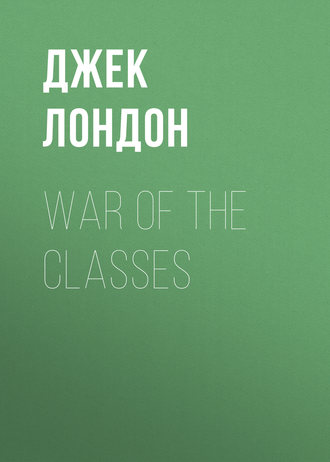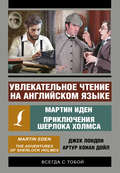
Джек Лондон
War of the Classes
In brief summary of these two notable books, it may be said that Mr. Ghent is alarmed, (though he does not flatly say so), at the too great social restfulness in the community, which is permitting the capitalists to form the new society to their liking; and that Mr. Brooks is alarmed, (and he flatly says so), at the social unrest which threatens the modified individualism into which he would like to see society evolve. Mr. Ghent beholds the capitalist class rising to dominate the state and the working class; Mr. Brooks beholds the working class rising to dominate the state and the capitalist class. One fears the paternalism of a class; the other, the tyranny of the mass.
WANTED: A NEW LAW OF DEVELOPMENT
Evolution is no longer a mere tentative hypothesis. One by one, step by step, each division and subdivision of science has contributed its evidence, until now the case is complete and the verdict rendered. While there is still discussion as to the method of evolution, none the less, as a process sufficient to explain all biological phenomena, all differentiations of life into widely diverse species, families, and even kingdoms, evolution is flatly accepted. Likewise has been accepted its law of development: That, in the struggle for existence, the strong and fit and the progeny of the strong and fit have a better opportunity for survival than the weak and less fit and the progeny of the weak and less fit.
It is in the struggle of the species with other species and against all other hostile forces in the environment, that this law operates; also in the struggle between the individuals of the same species. In this struggle, which is for food and shelter, the weak individuals must obviously win less food and shelter than the strong. Because of this, their hold on life relaxes and they are eliminated. And for the same reason that they may not win for themselves adequate food and shelter, the weak cannot give to their progeny the chance for survival that the strong give. And thus, since the weak are prone to beget weakness, the species is constantly purged of its inefficient members.
Because of this, a premium is placed upon strength, and so long as the struggle for food and shelter obtains, just so long will the average strength of each generation increase. On the other hand, should conditions so change that all, and the progeny of all, the weak as well as the strong, have an equal chance for survival, then, at once, the average strength of each generation will begin to diminish. Never yet, however, in animal life, has there been such a state of affairs. Natural selection has always obtained. The strong and their progeny, at the expense of the weak, have always survived. This law of development has operated down all the past upon all life; it so operates today, and it is not rash to say that it will continue to operate in the future – at least upon all life existing in a state of nature.
Man, preëminent though he is in the animal kingdom, capable of reacting upon and making suitable an unsuitable environment, nevertheless remains the creature of this same law of development. The social selection to which he is subject is merely another form of natural selection. True, within certain narrow limits he modifies the struggle for existence and renders less precarious the tenure of life for the weak. The extremely weak, diseased, and inefficient are housed in hospitals and asylums. The strength of the viciously strong, when inimical to society, is tempered by penal institutions and by the gallows. The short-sighted are provided with spectacles, and the sickly (when they can pay for it) with sanitariums. Pestilential marshes are drained, plagues are checked, and disasters averted. Yet, for all that, the strong and the progeny of the strong survive, and the weak are crushed out. The men strong of brain are masters as of yore. They dominate society and gather to themselves the wealth of society. With this wealth they maintain themselves and equip their progeny for the struggle. They build their homes in healthful places, purchase the best fruits, meats, and vegetables the market affords, and buy themselves the ministrations of the most brilliant and learned of the professional classes. The weak man, as of yore, is the servant, the doer of things at the master’s call. The weaker and less efficient he is, the poorer is his reward. The weakest work for a living wage, (when they can get work), live in unsanitary slums, on vile and insufficient food, at the lowest depths of human degradation. Their grasp on life is indeed precarious, their mortality excessive, their infant death-rate appalling.
That some should be born to preferment and others to ignominy in order that the race may progress, is cruel and sad; but none the less they are so born. The weeding out of human souls, some for fatness and smiles, some for leanness and tears, is surely a heartless selective process – as heartless as it is natural. And the human family, for all its wonderful record of adventure and achievement, has not yet succeeded in avoiding this process. That it is incapable of doing this is not to be hazarded. Not only is it capable, but the whole trend of society is in that direction. All the social forces are driving man on to a time when the old selective law will be annulled. There is no escaping it, save by the intervention of catastrophes and cataclysms quite unthinkable. It is inexorable. It is inexorable because the common man demands it. The twentieth century, the common man says, is his day; the common man’s day, or, rather, the dawning of the common man’s day.
Nor can it be denied. The evidence is with him. The previous centuries, and more notably the nineteenth, have marked the rise of the common man. From chattel slavery to serfdom, and from serfdom to what he bitterly terms “wage slavery,” he has risen. Never was he so strong as he is today, and never so menacing. He does the work of the world, and he is beginning to know it. The world cannot get along without him, and this also he is beginning to know. All the human knowledge of the past, all the scientific discovery, governmental experiment, and invention of machinery, have tended to his advancement. His standard of living is higher. His common school education would shame princes ten centuries past. His civil and religious liberty makes him a free man, and his ballot the peer of his betters. And all this has tended to make him conscious, conscious of himself, conscious of his class. He looks about him and questions that ancient law of development. It is cruel and wrong, he is beginning to declare. It is an anachronism. Let it be abolished. Why should there be one empty belly in all the world, when the work of ten men can feed a hundred? What if my brother be not so strong as I? He has not sinned. Wherefore should he hunger – he and his sinless little ones? Away with the old law. There is food and shelter for all, therefore let all receive food and shelter.
As fast as labor has become conscious it has organized. The ambition of these class-conscious men is that the movement shall become general, that all labor shall become conscious of itself and its class interests. And the day that witnesses the solidarity of labor, they triumphantly affirm, will be a day when labor dominates the world. This growing consciousness has led to the organization of two movements, both separate and distinct, but both converging toward a common goal – one, the labor movement, known as Trade Unionism; the other, the political movement, known as Socialism. Both are grim and silent forces, unheralded and virtually unknown to the general public save in moments of stress. The sleeping labor giant receives little notice from the capitalistic press, and when he stirs uneasily, a column of surprise, indignation, and horror suffices.
It is only now and then, after long periods of silence, that the labor movement puts in its claim for notice. All is quiet. The kind old world spins on, and the bourgeois masters clip their coupons in smug complacency. But the grim and silent forces are at work.
Suddenly, like a clap of thunder from a clear sky, comes a disruption of industry. From ocean to ocean the wheels of a great chain of railroads cease to run. A quarter of a million miners throw down pick and shovel and outrage the sun with their pale, bleached faces. The street railways of a swarming metropolis stand idle, or the rumble of machinery in vast manufactories dies away to silence. There is alarm and panic. Arson and homicide stalk forth. There is a cry in the night, and quick anger and sudden death. Peaceful cities are affrighted by the crack of rifles and the snarl of machine-guns, and the hearts of the shuddering are shaken by the roar of dynamite. There is hurrying and skurrying. The wires are kept hot between the centre of government and the seat of trouble. The chiefs of state ponder gravely and advise, and governors of states implore. There is assembling of militia and massing of troops, and the streets resound to the tramp of armed men. There are separate and joint conferences between the captains of industry and the captains of labor. And then, finally, all is quiet again, and the memory of it is like the memory of a bad dream.
But these strikes become olympiads, things to date from; and common on the lips of men become such phrases as “The Great Dock Strike,” “The Great Coal Strike,” “The Great Railroad Strike.” Never before did labor do these things. After the Great Plague in England, labor, finding itself in demand and innocently obeying the economic law, asked higher wages. But the masters set a maximum wage, restrained workingmen from moving about from place to place, refused to tolerate idlers, and by most barbarous legal methods punished those who disobeyed. But labor is accorded greater respect today. Such a policy, put into effect in this the first decade of the twentieth century, would sweep the masters from their seats in one mighty crash. And the masters know it and are respectful.
A fair instance of the growing solidarity of labor is afforded by an unimportant recent strike in San Francisco. The restaurant cooks and waiters were completely unorganized, working at any and all hours for whatever wages they could get. A representative of the American Federation of Labor went among them and organized them. Within a few weeks nearly two thousand men were enrolled, and they had five thousand dollars on deposit. Then they put in their demand for increased wages and shorter hours. Forthwith their employers organized. The demand was denied, and the Cooks’ and Waiters’ Union walked out.
All organized employers stood back of the restaurant owners, in sympathy with them and willing to aid them if they dared. And at the back of the Cooks’ and Waiters’ Union stood the organized labor of the city, 40,000 strong. If a business man was caught patronizing an “unfair” restaurant, he was boycotted; if a union man was caught, he was fined heavily by his union or expelled. The oyster companies and the slaughter houses made an attempt to refuse to sell oysters and meat to union restaurants. The Butchers and Meat Cutters, and the Teamsters, in retaliation, refused to work for or to deliver to non-union restaurants. Upon this the oyster companies and slaughter houses acknowledged themselves beaten and peace reigned. But the Restaurant Bakers in non-union places were ordered out, and the Bakery Wagon Drivers declined to deliver to unfair houses.
Every American Federation of Labor union in the city was prepared to strike, and waited only the word. And behind all, a handful of men, known as the Labor Council, directed the fight. One by one, blow upon blow, they were able if they deemed it necessary to call out the unions – the Laundry Workers, who do the washing; the Hackmen, who haul men to and from restaurants; the Butchers, Meat Cutters, and Teamsters; and the Milkers, Milk Drivers, and Chicken Pickers; and after that, in pure sympathy, the Retail Clerks, the Horse Shoers, the Gas and Electrical Fixture Hangers, the Metal Roofers, the Blacksmiths, the Blacksmiths’ Helpers, the Stablemen, the Machinists, the Brewers, the Coast Seamen, the Varnishers and Polishers, the Confectioners, the Upholsterers, the Paper Hangers and Fresco Painters, the Drug Clerks, the Fitters and Helpers, the Metal Workers, the Boiler Makers and Iron Ship Builders, the Assistant Undertakers, the Carriage and Wagon Workers, and so on down the lengthy list of organizations.
For, over all these trades, over all these thousands of men, is the Labor Council. When it speaks its voice is heard, and when it orders it is obeyed. But it, in turn, is dominated by the National Labor Council, with which it is constantly in touch. In this wholly unimportant little local strike it is of interest to note the stands taken by the different sides. The legal representative and official mouthpiece of the Employers’ Association said: “This organization is formed for defensive purposes, and it may be driven to take offensive steps, and if so, will be strong enough to follow them up. Labor cannot be allowed to dictate to capital and say how business shall be conducted. There is no objection to the formation of unions and trades councils, but membership must not be compulsory. It is repugnant to the American idea of liberty and cannot be tolerated.”
On the other hand, the president of the Team Drivers’ Union said: “The employers of labor in this city are generally against the trade-union movement and there seems to be a concerted effort on their part to check the progress of organized labor. Such action as has been taken by them in sympathy with the present labor troubles may, if continued, lead to a serious conflict, the outcome of which might be most calamitous for the business and industrial interests of San Francisco.”
And the secretary of the United Brewery Workmen: “I regard a sympathetic strike as the last weapon which organized labor should use in its defence. When, however, associations of employers band together to defeat organized labor, or one of its branches, then we should not and will not hesitate ourselves to employ the same instrument in retaliation.”
Thus, in a little corner of the world, is exemplified the growing solidarity of labor. The organization of labor has not only kept pace with the organization of industry, but it has gained upon it. In one winter, in the anthracite coal region, $160,000,000 in mines and $600,000,000 in transportation and distribution consolidated its ownership and control. And at once, arrayed as solidly on the other side, were the 150,000 anthracite miners. The bituminous mines, however, were not consolidated; yet the 250,000 men employed therein were already combined. And not only that, but they were also combined with the anthracite miners, these 400,000 men being under the control and direction of one supreme labor council. And in this and the other great councils are to be found captains of labor of splendid abilities, who, in understanding of economic and industrial conditions, are undeniably the equals of their opponents, the captains of industry.
The United States is honeycombed with labor organizations. And the big federations which these go to compose aggregate millions of members, and in their various branches handle millions of dollars yearly. And not only this; for the international brotherhoods and unions are forming, and moneys for the aid of strikers pass back and forth across the seas. The Machinists, in their demand for a nine-hour day, affected 500,000 men in the United States, Mexico, and Canada. In England the membership of working-class organizations is approximated by Keir Hardie at 2,500,000, with reserve funds of $18,000,000. There the coöperative movement has a membership of 1,500,000, and every year turns over in distribution more than $100,000,000. In France, one-eighth of the whole working class is unionized. In Belgium the unions are very rich and powerful, and so able to defy the masters that many of the smaller manufacturers, unable to resist, “are removing their works to other countries where the workmen’s organizations are not so potential.” And in all other countries, according to the stage of their economic and political development, like figures obtain. And Europe, today, confesses that her greatest social problem is the labor problem, and that it is the one most closely engrossing the attention of her statesmen.
The organization of labor is one of the chief acknowledged factors in the retrogression of British trade. The workers have become class conscious as never before. The wrong of one is the wrong of all. They have come to realize, in a short-sighted way, that their masters’ interests are not their interests. The harder they work, they believe, the more wealth they create for their masters. Further, the more work they do in one day, the fewer men will be needed to do the work. So the unions place a day’s stint upon their members, beyond which they are not permitted to go. In “A Study of Trade Unionism,” by Benjamin Taylor in the “Nineteenth Century” of April, 1898, are furnished some interesting corroborations. The facts here set forth were collected by the Executive Board of the Employers’ Federation, the documentary proofs of which are in the hands of the secretaries. In a certain firm the union workmen made eight ammunition boxes a day. Nor could they be persuaded into making more. A young Swiss, who could not speak English, was set to work, and in the first day he made fifty boxes. In the same firm the skilled union hands filed up the outside handles of one machine-gun a day. That was their stint. No one was known ever to do more. A non-union filer came into the shop and did twelve a day. A Manchester firm found that to plane a large bed-casting took union workmen one hundred and ninety hours, and non-union workmen one hundred and thirty-five hours. In another instance a man, resigning from his union, day by day did double the amount of work he had done formerly. And to cap it all, an English gentleman, going out to look at a wall being put up for him by union bricklayers, found one of their number with his right arm strapped to his body, doing all the work with his left arm – forsooth, because he was such an energetic fellow that otherwise he would involuntarily lay more bricks than his union permitted.
All England resounds to the cry, “Wake up, England!” But the sulky giant is not stirred. “Let England’s trade go to pot,” he says; “what have I to lose?” And England is powerless. The capacity of her workmen is represented by 1, in comparison with the 2¼ capacity of the American workman. And because of the solidarity of labor and the destructiveness of strikes, British capitalists dare not even strive to emulate the enterprise of American capitalists. So England watches trade slipping through her fingers and wails unavailingly. As a correspondent writes: “The enormous power of the trade unions hangs, a sullen cloud, over the whole industrial world here, affecting men and masters alike.”
The political movement known as Socialism is, perhaps, even less realized by the general public. The great strides it has taken and the portentous front it today exhibits are not comprehended; and, fastened though it is in every land, it is given little space by the capitalistic press. For all its plea and passion and warmth, it wells upward like a great, cold tidal wave, irresistible, inexorable, ingulfing present-day society level by level. By its own preachment it is inexorable. Just as societies have sprung into existence, fulfilled their function, and passed away, it claims, just as surely is present society hastening on to its dissolution. This is a transition period – and destined to be a very short one. Barely a century old, capitalism is ripening so rapidly that it can never live to see a second birthday. There is no hope for it, the Socialists say. It is doomed.
The cardinal tenet of Socialism is that forbidding doctrine, the materialistic conception of history. Men are not the masters of their souls. They are the puppets of great, blind forces. The lives they live and the deaths they die are compulsory. All social codes are but the reflexes of existing economic conditions, plus certain survivals of past economic conditions. The institutions men build they are compelled to build. Economic laws determine at any given time what these institutions shall be, how long they shall operate, and by what they shall be replaced. And so, through the economic process, the Socialist preaches the ripening of the capitalistic society and the coming of the new coöperative society.
The second great tenet of Socialism, itself a phase of the materialistic conception of history, is the class struggle. In the social struggle for existence, men are forced into classes. “The history of all society thus far is the history of class strife.” In existing society the capitalist class exploits the working class, the proletariat. The interests of the exploiter are not the interests of the exploited. “Profits are legitimate,” says the one. “Profits are unpaid wages,” replies the other, when he has become conscious of his class, “therefore profits are robbery.” The capitalist enforces his profits because he is the legal owner of all the means of production. He is the legal owner because he controls the political machinery of society. The Socialist sets to work to capture the political machinery, so that he may make illegal the capitalist’s ownership of the means of production, and make legal his own ownership of the means of production. And it is this struggle, between these two classes, upon which the world has at last entered.
Scientific Socialism is very young. Only yesterday it was in swaddling clothes. But today it is a vigorous young giant, well braced to battle for what it wants, and knowing precisely what it wants. It holds its international conventions, where world-policies are formulated by the representatives of millions of Socialists. In little Belgium there are three-quarters of a million of men who work for the cause; in Germany, 3,000,000; Austria, between 1895 and 1897, raised her socialist vote from 90,000 to 750,000. France in 1871 had a whole generation of Socialists wiped out; yet in 1885 there were 30,000, and in 1898, 1,000,000.
Ere the last Spaniard had evacuated Cuba, Socialist groups were forming. And from far Japan, in these first days of the twentieth century, writes one Tomoyoshi Murai: “The interest of our people on Socialism has been greatly awakened these days, especially among our laboring people on one hand and young students’ circle on the other, as much as we can draw an earnest and enthusiastic audience and fill our hall, which holds two thousand… It is gratifying to say that we have a number of fine and well-trained public orators among our leaders of Socialism in Japan. The first speaker tonight is Mr. Kiyoshi Kawakami, editor of one of our city (Tokyo) dailies, a strong, independent, and decidedly socialistic paper, circulated far and wide. Mr. Kawakami is a scholar as well as a popular writer. He is going to speak tonight on the subject, ‘The Essence of Socialism – the Fundamental Principles.’ The next speaker is Professor Iso Abe, president of our association, whose subject of address is, ‘Socialism and the Existing Social System.’ The third speaker is Mr. Naoe Kinosita, the editor of another strong journal of the city. He speaks on the subject, ‘How to Realize the Socialist Ideals and Plans.’ Next is Mr. Shigeyoshi Sugiyama, a graduate of Hartford Theological Seminary and an advocate of Social Christianity, who is to speak on ‘Socialism and Municipal Problems.’ And the last speaker is the editor of the ‘Labor World,’ the foremost leader of the labor-union movement in our country, Mr. Sen Katayama, who speaks on the subject, ‘The Outlook of Socialism in Europe and America.’ These addresses are going to be published in book form and to be distributed among our people to enlighten their minds on the subject.”
And in the struggle for the political machinery of society, Socialism is no longer confined to mere propaganda. Italy, Austria, Belgium, England, have Socialist members in their national bodies. Out of the one hundred and thirty-two members of the London County Council, ninety-one are denounced by the conservative element as Socialists. The Emperor of Germany grows anxious and angry at the increasing numbers which are returned to the Reichstag. In France, many of the large cities, such as Marseilles, are in the hands of the Socialists. A large body of them is in the Chamber of Deputies, and Millerand, Socialist, sits in the cabinet. Of him M. Leroy-Beaulieu says with horror: “M. Millerand is the open enemy of private property, private capital, the resolute advocate of the socialization of production.. a constant incitement to violence.. a collectivist, avowed and militant, taking part in the government, dominating the departments of commerce and industry, preparing all the laws and presiding at the passage of all measures which should be submitted to merchants and tradesmen.”
In the United States there are already Socialist mayors of towns and members of State legislatures, a vast literature, and single Socialist papers with subscription lists running up into the hundreds of thousands. In 1896, 36,000 votes were cast for the Socialist candidate for President; in 1900, nearly 200,000; in 1904, 450,000. And the United States, young as it is, is ripening rapidly, and the Socialists claim, according to the materialistic conception of history, that the United States will be the first country in the world wherein the toilers will capture the political machinery and expropriate the bourgeoisie.
***
But the Socialist and labor movements have recently entered upon a new phase. There has been a remarkable change in attitude on both sides. For a long time the labor unions refrained from going in for political action. On the other hand, the Socialists claimed that without political action labor was powerless. And because of this there was much ill feeling between them, even open hostilities, and no concerted action. But now the Socialists grant that the labor movement has held up wages and decreased the hours of labor, and the labor unions find that political action is necessary. Today both parties have drawn closely together in the common fight. In the United States this friendly feeling grows. The Socialist papers espouse the cause of labor, and the unions have opened their ears once more to the wiles of the Socialists. They are all leavened with Socialist workmen, “boring from within,” and many of their leaders have already succumbed. In England, where class consciousness is more developed, the name “Unionism” has been replaced by “The New Unionism,” the main object of which is “to capture existing social structures in the interests of the wage-earners.” There the Socialist, the trade-union, and other working-class organizations are beginning to coöperate in securing the return of representatives to the House of Commons. And in France, where the city councils and mayors of Marseilles and Monteaules-Mines are Socialistic, thousands of francs of municipal money were voted for the aid of the unions in the recent great strikes.
For centuries the world has been preparing for the coming of the common man. And the period of preparation virtually past, labor, conscious of itself and its desires, has begun a definite movement toward solidarity. It believes the time is not far distant when the historian will speak not only of the dark ages of feudalism, but of the dark ages of capitalism. And labor sincerely believes itself justified in this by the terrible indictment it brings against capitalistic society. In the face of its enormous wealth, capitalistic society forfeits its right to existence when it permits widespread, bestial poverty. The philosophy of the survival of the fittest does not soothe the class-conscious worker when he learns through his class literature that among the Italian pants-finishers of Chicago 9 the average weekly wage is $1.31, and the average number of weeks employed in the year is 27.85. Likewise when he reads: 10 “Every room in these reeking tenements houses a family or two. In one room a missionary found a man ill with small-pox, his wife just recovering from her confinement, and the children running about half naked and covered with dirt. Here are seven people living in one underground kitchen, and a little dead child lying in the same room. Here live a widow and her six children, two of whom are ill with scarlet fever. In another, nine brothers and sisters, from twenty-nine years of age downward, live, eat, and sleep together.” And likewise, when he reads: 11 “When one man, fifty years old, who has worked all his life, is compelled to beg a little money to bury his dead baby, and another man, fifty years old, can give ten million dollars to enable his daughter to live in luxury and bolster up a decaying foreign aristocracy, do you see nothing amiss?”
And on the other hand, the class-conscious worker reads the statistics of the wealthy classes, knows what their incomes are, and how they get them. True, down all the past he has known his own material misery and the material comfort of the dominant classes, and often has this knowledge led him to intemperate acts and unwise rebellion. But today, and for the first time, because both society and he have evolved, he is beginning to see a possible way out. His ears are opening to the propaganda of Socialism, the passionate gospel of the dispossessed. But it does not inculcate a turning back. The way through is the way out, he understands, and with this in mind he draws up the programme.
It is quite simple, this programme. Everything is moving in his direction, toward the day when he will take charge. The trust? Ah, no. Unlike the trembling middle-class man and the small capitalist, he sees nothing at which to be frightened. He likes the trust. He exults in the trust, for it is largely doing the task for him. It socializes production; this done, there remains nothing for him to do but socialize distribution, and all is accomplished. The trust? “It organizes industry on an enormous, labor-saving scale, and abolishes childish, wasteful competition.” It is a gigantic object lesson, and it preaches his political economy far more potently than he can preach it. He points to the trust, laughing scornfully in the face of the orthodox economists. “You told me this thing could not be,” 12 he thunders. “Behold, the thing is!”







